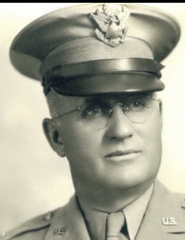SOUTH FRANCE LOOKS PEACEFUL
Miles Thinks Virtually No GI's to Be Radical
By Frank Miles (Iowa Daily Press War Correspondent)
Somewhere in the Mediterranean Theater (IDPA) - At low altitude, I flew over a part of the area where allies forces landed in southern France last month. Perfect visibility gave me a bird's eye view.
Except for barrage balloons and warships in the harbors, it looked so peaceful that it was hard to realize attacking planes and troops had been there. We landed twice on ground, where stiff nazi resistance had been expected. There was little to remind that the enemy ever had been there. He left too fast to leave tracks.
"You are American?" a middle-aged French civilian inquired.
"An Iowa American," I replied
He obviously didn't know what kind of American that was but he thought Americans more than all right.
"You saved France in 1918," he continued. "You are saving France again. We are thankful for you Americans. Yours is a great country."
A GI behind me entered the conversation.
"Wish I was back there," he commented wistfully.
I turned to shake hands with Cpl. Lawrence Tallman of Cheyne, Wyo., who, it developed, left Dallas county, Iowa in infancy. Soon after his birth on a farm there, his parents moved. An air force mechanic, he wanted to get home to be present for a special event scheduled for early November - birth of a baby to his young wife.
"Hope it's twins or triplets," he confided.
"No, I haven't had it so tough on this side," he said in response to my question, "not nearly so tough as some of the guys. I ain't kicking over my job or the food or the treatment I get -- I'm just homesick to be there when I become daddy."
"What are you going to do when you get home to stay?" I asked.
"Find a job of some kind -- I ain't worrying about that -- I'm a working man and I always have been able to get something to do."
Some officers and men with whom I have talked say they want to return home after the war and make a living, adding that they are willing to let the people there, who have been running things, keep on running them. I imagine that when they return, though, that it won't be long before they speak and act in ways affecting affairs where they live.
Not one in a thousand in my judgment will have radical ideas if conditions are normal. These men love the country they are fighting for and will want to do things for its benefit. Some gripe over reports of complacency at home they receive in the home town newspapers and letters but they readily recognize American civilians have no conception of what war is like.
Most of the American soldiers with whom I have talked complain little about having to be at war. I heard much more grousing at home about rationing and other war caused inconvenience from civilians, who, actually, weren't suffering a particle.
Source: Mason City Globe-Gazette, September 25, 1944
![]()

